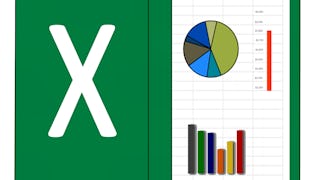![[Featured image] A business analyst interviews an employee. Both of them have their laptops in front of them.](https://images.ctfassets.net/wp1lcwdav1p1/5vfQELyaDvsspcLpsigHEy/ec1810ecd32ac851a47d952a4f5d1e5d/dat_analyst_vs_business_analyst.png?w=330&h=216&q=60&fit=fill&f=faces&fm=jpg&fl=progressive)
Business Analyst vs. Data Analyst: What’s the Difference?
Learn how data analysts and business analysts work with data to drive better business decisions (and find out which might be a better career fit for you).
April 16, 2021
Article
Business analysts use data to identify ways that businesses can improve efficiency, reduce costs, or strengthen processes. Learn how to get started in this growing career path.

Grow key business analysis skills

University of Pennsylvania
Skills you'll gain: People Analytics, Data-Driven Decision-Making, Fraud detection, Business Analytics, Descriptive Analytics, Financial Data, Marketing Analytics, Analytics, Talent Management, Financial Analysis, Predictive Analytics, Human Resources Management and Planning, Peer Review, Data Analysis, Business Analysis, Financial Statement Analysis, Financial Forecasting, Customer Insights, Workforce Planning, Demand Planning
Beginner · Specialization · 3 - 6 Months

Microsoft
Skills you'll gain: Microsoft Power Platform, Excel Formulas, Process Flow Diagrams, Business Process Modeling, User Story, Business Requirements, Stakeholder Management, Data Modeling, Microsoft Excel, Software Development Life Cycle, Requirements Analysis, Requirements Elicitation, Quality Management, Pivot Tables And Charts, Microsoft Visio, Power BI, Microsoft Power Automate/Flow, Business Analysis, Scrum (Software Development), Data Analysis
Beginner · Professional Certificate · 3 - 6 Months

Johns Hopkins University
Skills you'll gain: Risk Modeling, Regression Analysis, Microsoft Excel, Business Analytics, Business Modeling, Business Analysis, Resource Allocation, Analysis, Statistical Analysis, Process Optimization, Financial Analysis, Predictive Analytics, Transportation Operations, Linear Algebra
Intermediate · Course · 1 - 3 Months
A business analyst uses data to discover new business insights for a company. They typically focus on improving efficiency and effectiveness, and may work across all areas of business, including IT processes, organizational structure, or supply chain management.
At the entry-level, a business analyst may participate in team efforts to identify and prioritize an organization’s functional and technical needs, use SQL and spreadsheet software to conduct data analysis, and create data visualizations and financial models in order to address crucial business questions.
Similar and adjacent roles include IT business analysts, data analysts, business data analysts, supply chain analysts, and business intelligence analysts.
Learn more about entry-level careers in business analysis:
Take the quiz: Career Test: What Career is Right for Me Quiz?
Learn the essential terms: Power BI Terms and Definitions
Watch on YouTube: Career Spotlight: Business Analyst
Ready to start learning? Explore our business analytics courses catalog or accelerate your career growth with a Coursera Plus subscription. When you enroll in either the monthly or annual option, you’ll get access to over 10,000 courses.
The average base salary for a business analyst with 0-1 years of work experience is $69,847 in the US as of February 2024, according to Glassdoor*. With 1-3 years of experience, the average salary increases to $77,467, and across all years of experience, the average salary is $87,692.
*Glassdoor. “Business Analyst Salaries, https://www.glassdoor.com/Salaries/business-analyst-salary-SRCH_KO0,16.htm.” Accessed February 2, 2024.
Some skills to include on a business analyst resume are data analysis (such as cleaning, sorting, and visualizing data, programming languages like SQL, Python, or R, and programs like Microsoft Excel, Google Sheets, and Tableau), business strategy, financial analysis, and problem-solving.
To become a business analyst, first sharpen your business analysis skills. Gain a strong understanding of data analysis and business strategy. It may help to take a course, earn a certificate, or earn a degree in business or data analysis. Then, start searching for entry-level roles in an accounting, finance, or business setting. Try searching for job titles like “junior business analyst” or “entry-level business analyst.” Check out our entry-level job guide for more job search tips.